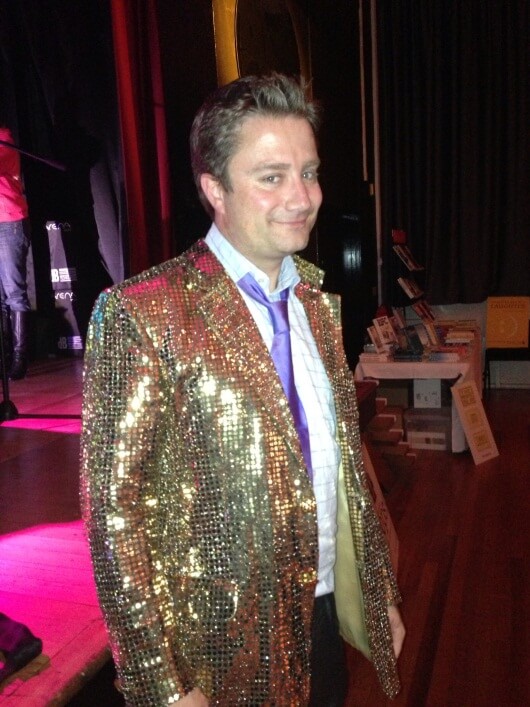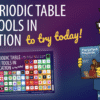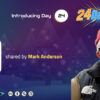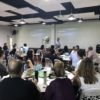In recent times I’ve been lucky enough to be asked to speak at a number of different events. Ive delivered at In-house INSET sessions on iPads and learning, Web 2.0 tools, how to embed EdTech in to learning. That’s not including TeachMeet Clevedon events and all of the other TeachMeets I’ve spoken at plus must recently an Apple iPad Leadership Summit in Somerset. It’s been fantastic. It’s helped me grow so much professionally, but upon reflection it’s made me realise how much of a learning experience it can be to be the person standing at the front of the audience too. I always take something from the sessions to improve my pedagogy in the classroom too.
One of my personal aims of setting up TeachMeet Clevedon was to give myself more opportunity to talk in front of peers. I never suffer from nerves speaking in front of students but following my first INSET session at school, I’d been surprised to find myself nigh on a nervous wreck at the prospect of speaking to colleagues. How could it be that something I do daily with no concerns make me feel like I was going to be a gibbering idiot when speaking to peers? Certainly, if I’d read this post here: http://sinesandwonders.blogspot.co.uk/2012/09/the-ten-commandments-of-cpd.html?spref=tw “The ten commandments of CPD” I’d probably never have bothered – what a tough crowd (although a great post where I agree with most points).
As I’ve gained in confidence and honed my delivery in front of a peer based audience rather than a teacher / student audience (and I know I’m still not as amazing as some people…)
I know I’m definitely getting better and I know I still have a lot to learn.
I put this down to the process being a two way street. The reflective practice of a teacher is paramount to making the best difference to the students in your classroom. This is also true when speaking to classrooms of a different type. In his post on the ten commandments of CPD, @dazmck speaks his mind about making sure that the experience is worthwhile for the audience. He talks about speakers not wasting his time otherwise he’d be out of the door quicker than you could say ‘buzz word’. For me the reflective feedback process helps to make me better at being a better speaker in this forum.
I’m pleased that I’m posting this after the mighty Pete Jones @pekabelo wrote his reflective post about his visit to TeachMeet Clevedon a few weeks ago. Before the event, we were lucky enough to have Pete spend the day with us at the school. As you’ll read in his post he found the visit really helpful in terms of his continuing professional development – not only from the TeachMeet event in the evening but also through the visit during the day too. I have to say, that this was definitely a two way street experience. Pete brought with him a wealth of knowledge, experience, understanding and skill related to PBL and Art education. Pete was definitely there to learn things for himself and for our school – I’m very confident we came off just as richly. His tempered experience brought insight to our Art department, gave me food for thought, helped give the voice of experience in a lunch time PBL planning meeting, provided us with a literal roadmap (ok train map) of key Twitter users to follow for inspiration, professional development and help. So, whilst he may have come for himself, I know we have gained just as much, if not more, from the experience.
As the person standing at the front of an audience, I know that I have learned loads from the experience as those who’ve been polite enough to put up with me. Feedback tells me that my sessions are informative, interesting, engaging and some have even said inspiring, although I wouldn’t say that about myself. I would just like to thank people who’ve seen me speak.
Writing this post also stirs up memories of a conversation with David Didau @learningspy some time ago about the idea of mini TeachMeet discussions in staff briefings. He said that many staff would feel worried/concerned about standing up in front of their peers in a staff briefing to talk about something, albeit briefly. I have to say, although somewhat belatedly, that I have to agree with him, that it is a nerve wracking experience – I’ve lived it and done it. My argument now though is that by affording myself opportunities to develop myself in this way, to move forward away from the weakness that I most definitely had, is something which I would say is well worth gripping with both hands. Move forward. Have a go. Become better. Try not to fail. If you do fail better (as we keep on saying) SO THAT you then become more confident, grow, develop and learn more. I know for sure that your overall practice will develop as a result. Your audience will definitely learn from your experiences and you’ll grow too as part of the process.















